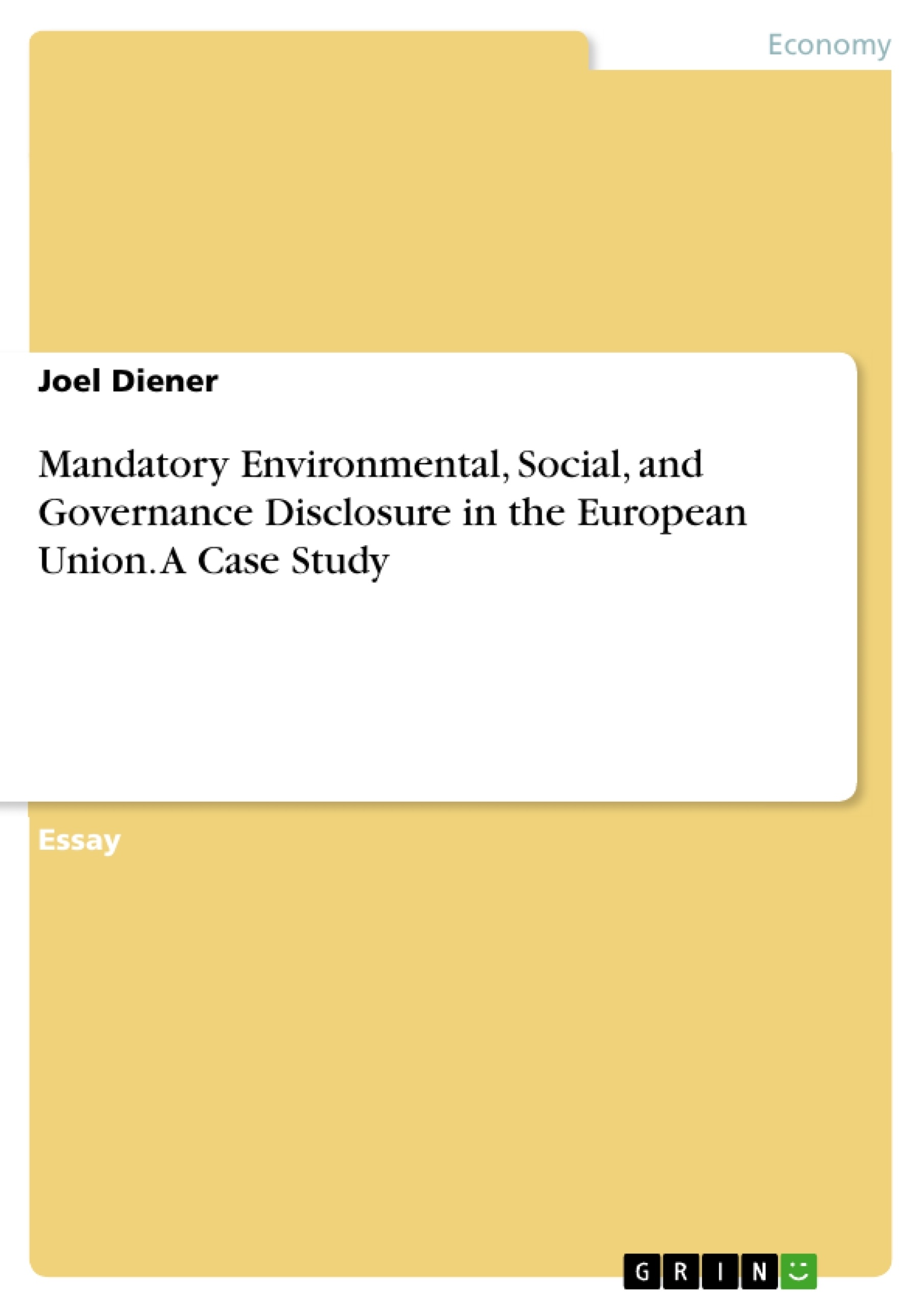This case study examines the issue of introducing mandatory environmental, social, and governance disclosure in
the European Union. It focuses on the plans of the European Commission (EC) and examines possible problems as well as their causes, solutions and alternatives. The aspect of implementing and justifying a mandatory and integrated report on corporate social responsibility is also highlighted.
Inhaltsverzeichnis (Table of Contents)
- Statement of the problem
- Causes of the problem
- Recommended solution, decision criteria and alternative solutions
- Implementation and justification
Zielsetzung und Themenschwerpunkte (Objectives and Key Themes)
The report aims to analyze the feasibility and benefits of mandatory environmental, social, and governance (ESG) disclosure for companies in the European Union. It explores the challenges and opportunities associated with integrating ESG reporting into existing financial reporting frameworks.
- The importance of corporate social responsibility (CSR) and sustainability reporting
- The role of ESG disclosure in building trust and transparency
- The benefits of integrated reporting for stakeholders and investors
- The impact of mandatory ESG disclosure on corporate decision-making and long-term growth
- The challenges of measuring and reporting ESG performance
Zusammenfassung der Kapitel (Chapter Summaries)
- Statement of the problem: This chapter introduces the context of mandatory ESG disclosure in the European Union, highlighting the increasing demand for transparency and accountability from corporations. It discusses the rationale behind the European Commission's (EC) initiative to introduce standardized ESG reporting guidelines.
- Causes of the problem: This chapter examines the historical development of CSR and the challenges associated with voluntary reporting. It discusses the lack of standardized frameworks, the difficulties in measuring ESG performance, and the limited motivation for companies to disclose ESG information.
- Recommended solution, decision criteria and alternative solutions: This chapter presents the International Integrated Reporting Committee's (IIRC) framework for ESG reporting, emphasizing the importance of integrated reporting and the need for clear and concise information. It also discusses the role of stakeholders, investors, and the public in promoting ESG disclosure.
- Implementation and justification: This chapter outlines the potential benefits of mandatory ESG disclosure, including improved transparency, enhanced investor confidence, and a more holistic approach to corporate decision-making. It also addresses concerns regarding the implementation process and the need for clear guidelines and performance indicators.
Schlüsselwörter (Keywords)
The report focuses on key concepts such as Corporate Social Responsibility (CSR), Environmental, Social, and Governance (ESG) disclosure, sustainability reporting, integrated reporting, key performance indicators (KPIs), stakeholder engagement, and the European 2020 initiative.
Frequently Asked Questions
What is mandatory ESG disclosure?
It refers to the legal requirement for companies to report on their Environmental, Social, and Governance performance, rather than doing so voluntarily.
Why is the European Commission planning standardized ESG reporting?
The goal is to increase transparency, build stakeholder trust, and ensure that ESG information is comparable across different corporations in the EU.
What is "Integrated Reporting" (IR)?
Integrated Reporting combines financial information with ESG data in a single report to provide a holistic view of a company's value creation over time.
What are the challenges of measuring ESG performance?
Key challenges include the lack of standardized frameworks, difficulties in quantifying social impacts, and the complexity of supply chain transparency.
How does ESG disclosure benefit investors?
It provides investors with critical information on long-term risks and sustainability, helping them make more informed and responsible investment decisions.
- Quote paper
- Joel Diener (Author), 2014, Mandatory Environmental, Social, and Governance Disclosure in the European Union. A Case Study, Munich, GRIN Verlag, https://www.grin.com/document/304608



